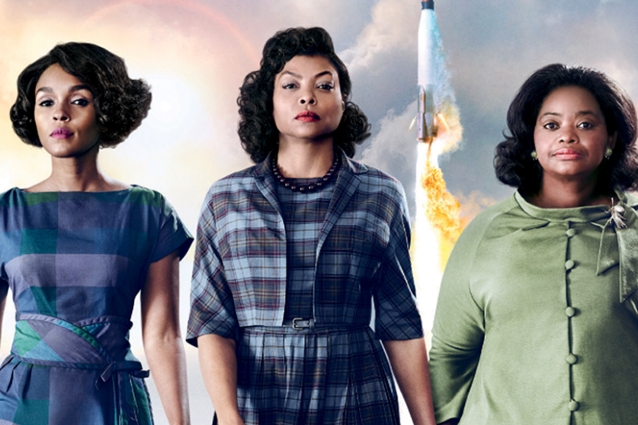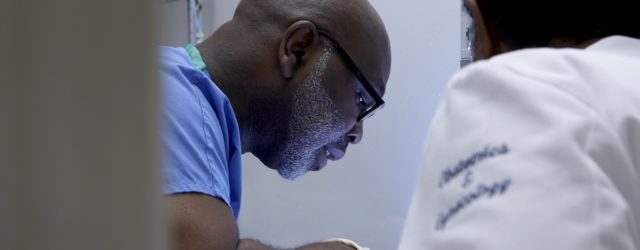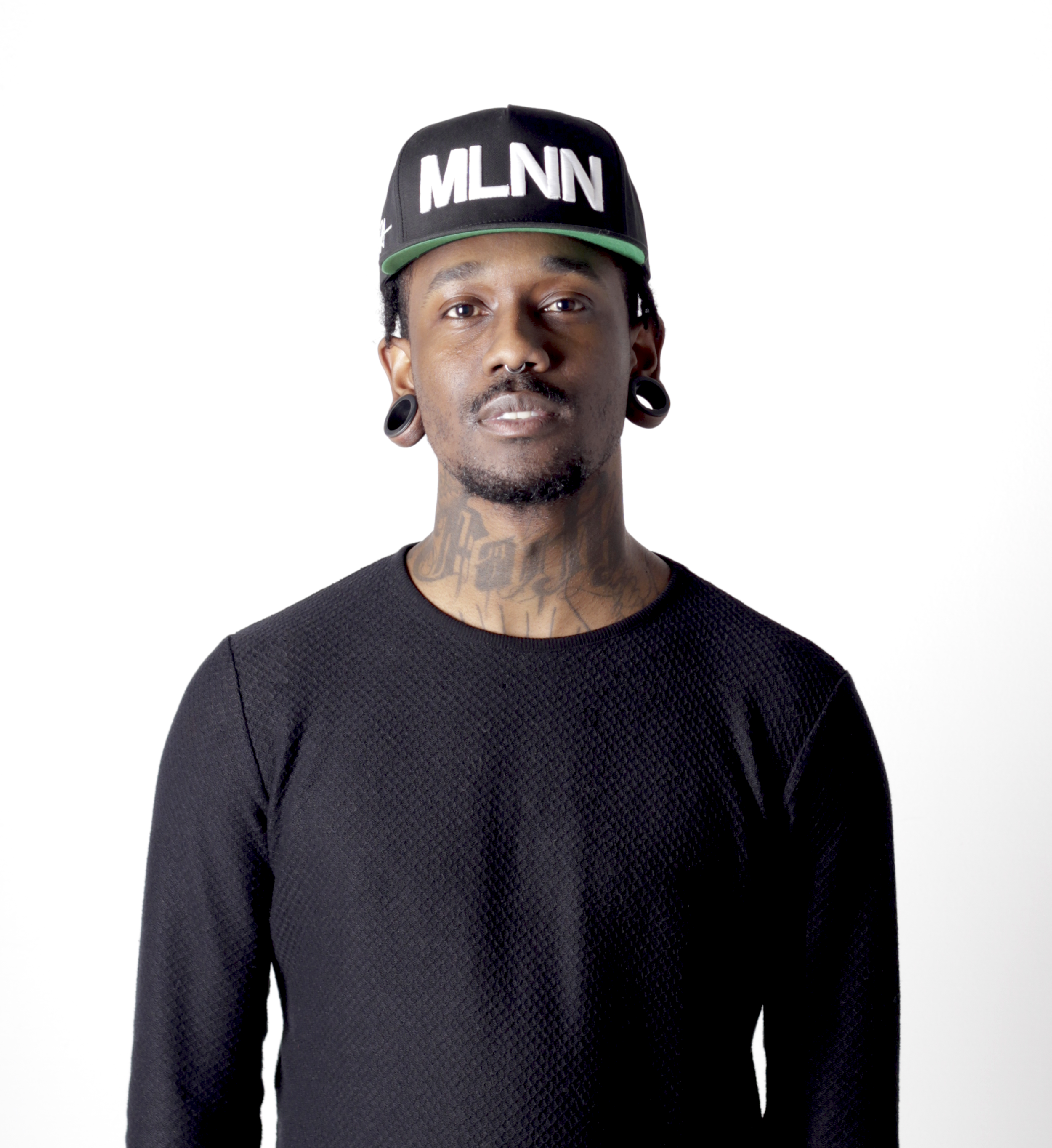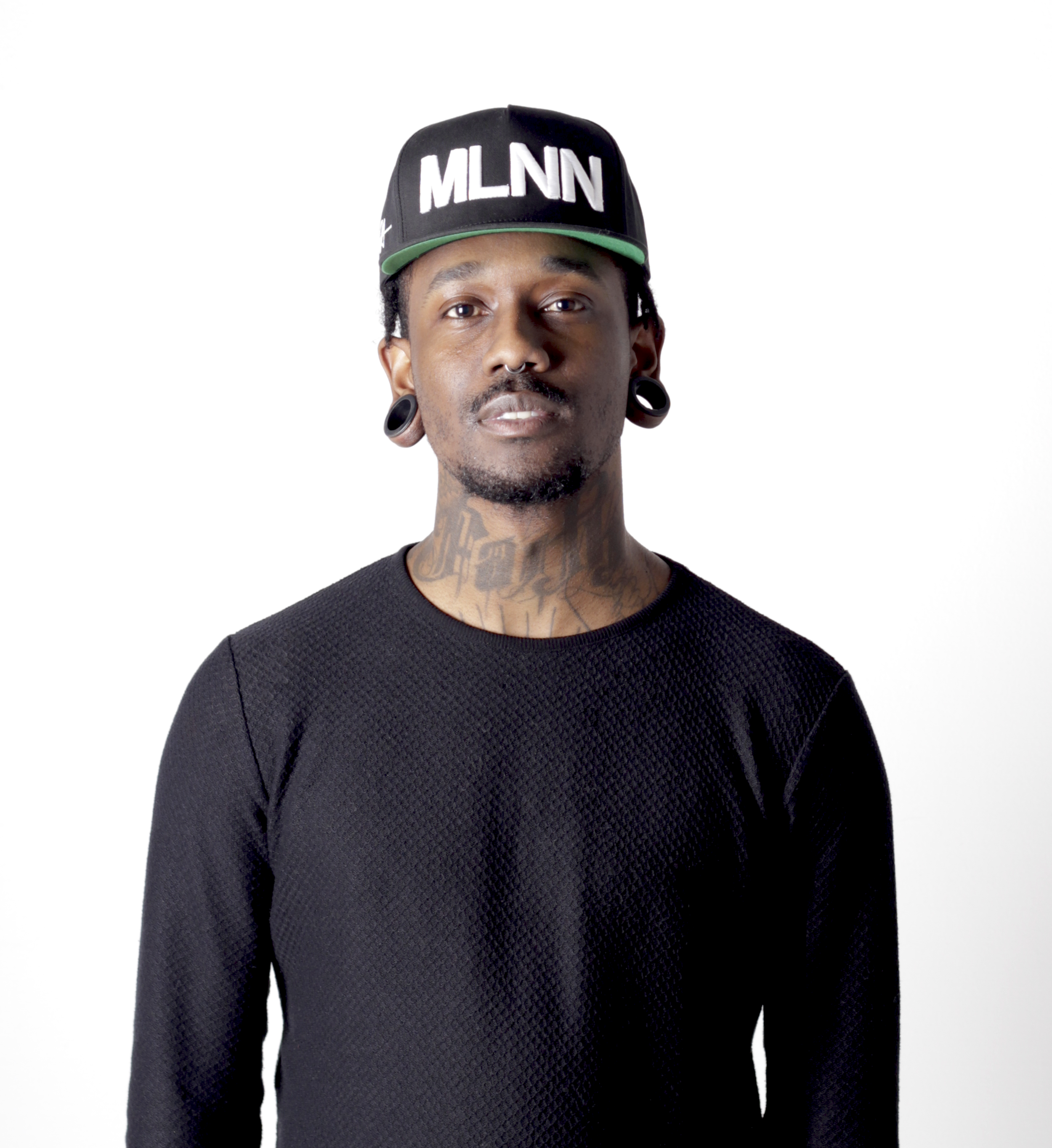 It is no secret that American history is often white-washed and male -centered, erasing the dedicated work of women and people of color; especially Black women who have worked tirelessly throughout time to make this country what it is today. The story of Katherine Johnson, Dorothy Vaughan and Mary Jackson, Black female scientists and mathematicians who played an integral role in getting the United States into the race for human space flight is just one of those stories. Based on the compelling book by Margot Lee Shetterly, “Hidden Figures” tells the story of this visionary trio of women who crossed every barrier in order to make space travel possible.
It is no secret that American history is often white-washed and male -centered, erasing the dedicated work of women and people of color; especially Black women who have worked tirelessly throughout time to make this country what it is today. The story of Katherine Johnson, Dorothy Vaughan and Mary Jackson, Black female scientists and mathematicians who played an integral role in getting the United States into the race for human space flight is just one of those stories. Based on the compelling book by Margot Lee Shetterly, “Hidden Figures” tells the story of this visionary trio of women who crossed every barrier in order to make space travel possible.
Recently at a press conference in New York City, I got the opportunity to sit down with Taraji P. Henson (Katherine Johnson), Octavia Spencer (Dorothy Vaughan), “Hidden Figures” author Margot Lee Shetterly, producer Pharrell Williams, Director Ted Melfi, NASA Astronaut Stephanie Wilson and NASA Historian Bill Barry. The cast and crew discussed why they were inspired to come on to the project, what they learned from the real-life figures, and why this history is so important today.
“Hidden Figures” is a film about bringing everyone together. Can you discuss how you brought the cast together?
Theodore Melfi: Octavia Spencer was the first actor to read the screenplay, and she said she wanted to be involved right away. She couldn’t even decide which role, but she decided she wanted to be involved. When I got the script and the book proposal…it all started with a fifty-five-page book proposal that Margot Lee Shetterly wrote. Margot grew up around these amazing women. I’ve also wanted to work with Taraji [P. Henson] since I saw “The Curious Case of Benjamin Button.” I thought she was just brilliant in it, so watching her grow to Cookie on “Empire,” I knew she could pretty much do anything. She’s a consummate actor first and foremost. Then, Janelle Monáe, I wanted someone new and fresh, and Janelle came in and auditioned and strangely enough fought for the part just like her character fights for her rights in the film.
Taraji and Octavia, since you are playing women who actually existed and did all of these things, how important was it for you to know about them personally, versus just the film version of these women?
Taraji P. Henson: When you are portraying a person that is very real, in my case, Katherine [Johnson] is still alive, she is 98-years old; there is a responsibility to get it right. So, as soon as I signed on to the project, I asked Ted immediately if she was still alive. When he said yes I said, “I have to meet her immediately.” At the time she was 97, so I flew down with Ted, and when we got there, her daughters came out and met me and they were so happy. They said, “We’re so glad they got you to play our mother.” I was like, “No, pressure.” (Laughing) I went in to sit with Katherine, and it was like waiting for the queen. That’s how it felt. She came in, and I was just like, “Wow, I’m in the presence of a real life superhero.” I guess the biggest thing that I took away from Katherine was her humility. When you talk about superheroes there are selfless, they don’t think about themselves, they put humanity first. I talked to her, and I tried to make it weighty by asking things like, “How as a Black woman did you do it? They were misogynistic, and I’m sure you got called the n-word.” She was just like, “Well, that was the way it was. I just did my job. I wanted to do my job.” She was just so humble. She would always say, “we.” In my mind I’m like, “No, Katherine it was you. It was your mind alone that got [John] Glenn to orbit the earth.” He didn’t say, “Go get so in so.” He said, “Go get that smart girl.” But that fact that that she sees the “we” in “I,” blew me away. Also her passion for math, the way I light up when I get asked questions about acting is the way her eyes danced when she talked about math and how she wanted people to fall in love with numbers the way that she did. If I had a teacher like that, I could have been a rocket scientist. When I was growing up, no one ever said to me, “You cannot do math because you’re a girl.” But, there was an understanding growing up that math and science were for boys. Somebody lied to me because this woman exists, all of these women existed. I made it my mission to do this film right because I didn’t want another girl to grow up believing the myth and the lie. I’m gonna give it to Octavia because I can go on and on.
Octavia Spencer: (Laughing) Thank you, Taraji. For me, it was a very different process because [Dorothy Vaughn] is no longer with us, but her family is and her legacy remains. Even though I knew I wanted to be a part of the film early on, when I finally knew that it was going and that I was going to be in the movie, it was a three and a half week period; so very little time. I started panicking, and I then thought I should Google and find out as much information about Dorothy as possible. But there was very little. Now if you Google her, you will see a lot of things referring to Margot’s book and you’ll get to see NASA archives, which I got a lot of that and you’ll see a lot of things referring to the film. But, it was important to get it right. It is important to learn as much as you can about the person and then throw it all away so that you’re not in any way doing some sort of mimicry. What was wonderful was that Ted gave us a lot of the archival footage from NASA and then the opening chapters that corresponded to our characters. He didn’t betray Margot by giving us a lot of the main text, he was like, “I’m only giving you the background.”
TPH: The book was being written while the film was being shot, so it happened simultaneously.
OS: Yes. There were lots of moving parts. So for me the research part was integral but, if this is the first time these women are being introduced to the world in this way, there are enough negative images of Black women out there and I did not want to portray [Dorothy] in any stereotype. I wanted to make sure that her integrity was preserved.
The opening scene of the film where the women have a car issue and the cop comes up, it just resonates so well with what’s happening today. Do you think that’s one of the reasons the film is so compelling because it speaks to the world that we are living in now?
OS: The opening scene for me is like this beautiful metaphor of what was to come in their lives; the love and comradery and fidelity that they had with each other as friends. But it was a twisty winding road that they had to navigate and negotiate in a very interesting way and I think Ted did a brilliant job in displaying that.
TPH: He really did! I think that scene is just so powerful because you can feel the whole audience brace themselves when the cop arrives. But what’s beautiful about that scene is that you see this man unlearn racism right before your very eyes, and it proves to you that your perception can change in a manner of minutes. And that’s when you know that racism is learned. He literally sees that these women mattered, these women’s lives mattered to the great space race so that negativity that he was about to spew on to them shifted in a blink of an eye. If we as a human race can all get back to one goal that we can focus on, I think that the world would be more balanced.
TM: I think that opening scene is also a classic example of art imitating life. We wrote that scene and shot that scene long before the string of police shootings against Black motorists. Who could have predicted that? Who could have predicted the passing of John Glenn? These things make the movie even more important to us.
Let’s talk about the juxtaposition between the NASA world and what was happening in real life. Did anyone have a chance to speak with Katherine about what it was like to be in that world and then to step outside and have to battle for human rights?
TPH: I did touch on that when I spoke with her, but what I notice even when I talk to my grandmother or anybody who is from that era is that they didn’t wallow in the muck, they didn’t do that; they just didn’t. Yes, they marched when there was an injustice, but every day was not a march. At some point, they said, “OK, this is what it is. Put your head to the ground, grind and get through it, because your hard work is going to open up doors for those coming behind.” So Katherine never complained, it just was what it was. She just said, “I just wanted to go to work and do my numbers.” And she stopped right there. I think about that as a Black woman in Hollywood when I’m asked about diversity. I hate when people say diversity because the first thing you jump to is Black and white. When you talk about diversity, you’re talking about women being hired in front of and behind the camera. You are talking about people with disabilities, the LGBTQ community…so I hate when people think about diversity, and they look at the Black actor, and they’re like “Go!” It’s like; we’re just scratching the surface. It just doesn’t start with me. We think so small. When I get that question I don’t go, “Yeah, well you know they don’t pay me.” That’s not my story. I own six properties; Hollywood has been damn good to me. Now you can ask me, “Have they paid you what you deserve?” That’s the question, but you’d have to go to the studios, I don’t know. I do the work! But to go back to your point, it gave me this new perspective to stop complaining. There is always going to be love versus hate; we struggle with that as humans within ourselves every day; as a society, we have to struggle. So when you wake up, you have to decide which side you’re going to be on. Hopefully, that side is positive, so you do the work and hope that your legacy will help change things.
Continue Reading at Shadow and Act.




 It is no secret that American history is often white-washed and male -centered, erasing the dedicated work of women and people of color; especially Black women who have worked tirelessly throughout time to make this country what it is today. The story of Katherine Johnson, Dorothy Vaughan and Mary Jackson, Black female scientists and mathematicians who played an integral role in getting the United States into the race for human space flight is just one of those stories. Based on the compelling book by Margot Lee Shetterly, “Hidden Figures” tells the story of this visionary trio of women who crossed every barrier in order to make space travel possible.
It is no secret that American history is often white-washed and male -centered, erasing the dedicated work of women and people of color; especially Black women who have worked tirelessly throughout time to make this country what it is today. The story of Katherine Johnson, Dorothy Vaughan and Mary Jackson, Black female scientists and mathematicians who played an integral role in getting the United States into the race for human space flight is just one of those stories. Based on the compelling book by Margot Lee Shetterly, “Hidden Figures” tells the story of this visionary trio of women who crossed every barrier in order to make space travel possible.
 There is one abortion clinic left in the state of Mississippi, and there are three in the state of Alabama. Since 2010, in a flurry of backlash aimed at the Obama Administration, state governments particularly in the South, have passed a series of restrictive laws attacking women’s health rights and access to abortions. These TRAP laws, or Targeted Regulations of Abortion Providers, are spreading rapidly across the United States, primarily affecting impoverished women and women of color.
There is one abortion clinic left in the state of Mississippi, and there are three in the state of Alabama. Since 2010, in a flurry of backlash aimed at the Obama Administration, state governments particularly in the South, have passed a series of restrictive laws attacking women’s health rights and access to abortions. These TRAP laws, or Targeted Regulations of Abortion Providers, are spreading rapidly across the United States, primarily affecting impoverished women and women of color.
 Growing up, I spent many Saturday mornings with my eyes glued to cartoons on the television screen. Superheroes, whether it was Batman, Superman or the Teenage Mutant Ninja Turtles, have always been a part of my life in some small way or another. Though I moved on from these iconic characters to fantasy epics like “Harry Potter” and “Lord of the Rings”, superheroes have once again returned to the forefront of popular culture. For me, it was Christopher Nolan’s “Batman” trilogy and the revival of the Marvel and DC Comic franchises in the past few years that grabbed my attention. Unfortunately, as with most programming that comes out of Hollywood, these “new age” superheroes have failed to represent people of color. However, with Chadwick Boseman being cast as Black Panther, and with the franchise being helmed by critically acclaimed director Ryan Coogler, this has begun to change that conversation. Big changes are also happening on a slightly smaller scale.
Growing up, I spent many Saturday mornings with my eyes glued to cartoons on the television screen. Superheroes, whether it was Batman, Superman or the Teenage Mutant Ninja Turtles, have always been a part of my life in some small way or another. Though I moved on from these iconic characters to fantasy epics like “Harry Potter” and “Lord of the Rings”, superheroes have once again returned to the forefront of popular culture. For me, it was Christopher Nolan’s “Batman” trilogy and the revival of the Marvel and DC Comic franchises in the past few years that grabbed my attention. Unfortunately, as with most programming that comes out of Hollywood, these “new age” superheroes have failed to represent people of color. However, with Chadwick Boseman being cast as Black Panther, and with the franchise being helmed by critically acclaimed director Ryan Coogler, this has begun to change that conversation. Big changes are also happening on a slightly smaller scale.